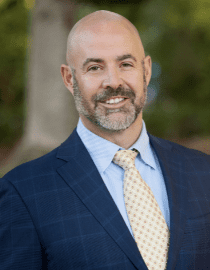By Andrew Cohen

Wayne Stacy knows the old adage that the only thing harder than getting to the top is staying there. But if that adds pressure to leading the center at the head of Berkeley Law’s top-ranked intellectual property law program, you could never tell.
The new executive director of the school’s Berkeley Center for Law & Technology (BCLT), Stacy brings public sector leadership, private practice success, and law school teaching experience to the position — and a firm belief in the center’s importance.
“Maintaining rankings and stature aren’t the motivation. The motivation comes from our ability to help the legal community — including students, professors, and practitioners — adapt to changing technologies and changing laws,” Stacy says. “I recognize the impact that BCLT has had on the legal community over the past 25 years, and I’m excited to be part of the team guiding BCLT into its next 25 years. By doing our job well, we will remain No. 1.”
Stacy comes to Berkeley from the U.S. Patent and Trademark Office, where served as a regional director in San Jose. Previously, he was a partner and chaired the intellectual property department at Baker Botts in the firm’s San Francisco office. Stacy also was a partner at Cooley LLP in Denver and played a key role in propelling the Rocky Mountain IP Institute.
“BCLT has a wonderful ability to identify unique legal issues facing tech companies and pull together the right people to discuss the problems,” he says. “As a law firm attorney, I had the opportunity to be part of several BCLT events and I was always impressed. I was attracted to this position because it provides the opportunity to be on the front lines of identifying and solving the emerging legal issues facing tech companies.”
Stacy replaces James Dempsey, who led BCLT for 6½ years and retired on May 28. An authority on privacy and internet policy who led Berkeley Law’s robust tech law curriculum and programming, Dempsey will continue to teach cybersecurity law in the school’s LL.M. Program. His new book, Cybersecurity Law Fundamentals, will be published this summer by the International Association of Privacy Professionals.
“I’ve always enjoyed being part of a team, an institution, and Berkeley Law is a great institution to be part of,” Dempsey says. “At all levels, a large percentage of the people here are mission-oriented, which to me is a very important standard. I’m very proud to have maintained BCLT’s leadership standing while also building it out with the Asia IP & Technology Law Project headed by Mark Cohen.”
Turbo-charged transition

Over the past month, Dempsey and Stacy have worked furiously ramping up BCLT’s new Project on Law and Innovation in the Life Sciences to develop an unrivaled program in that area. They expect to have a project director in place by late summer to help Berkeley Law forge meaningful connections with the local life sciences community.
“We’re also focusing on generating more opportunities for mid-level attorneys to work with BCLT and showcase their legal skills,” Stacy says. “These types of opportunities, which typically are only available to very senior attorneys, can dramatically change a mid-level attorney’s career path for the better. In this way, BCLT is supporting the development of the next generation of tech lawyers.”
Previously an adjunct professor at four law schools, including Berkeley, Stacy has taught copyright, patent law, and patent litigation while advocating for greater mentorship, diversity, and inclusion in the tech-law arena. As law schools, the legal profession, and the economy emerge from the COVID-19 pandemic, he sees the laws surrounding technology constantly evolving — both formally and in the way they are practiced.
“Attorneys are challenged to keep up with these evolutions at all stages of their careers,” Stacy says. “Simply put, the learning starts on day one of law school and ends when you retire. I see BCLT as playing a crucial role in helping attorneys keep up with and anticipate changes all along their career path.”
While the changes in technology have been rapid, Dempsey notes that the fundamentals remain as important as ever. Under his watch, BCLT has innovated with new classes in privacy counseling, biotech, and the law of social media while also urging students to gain a grounding in courses such as business associations, administrative law, evidence, and negotiations.
“Over a 30-year career, our students will have to learn about technologies that don’t even exist today,” Dempsey says. “All your career you’re going to be representing corporations or suing corporations or working for corporations, so you better learn corporations law when you have the chance at law school.”
While Dempsey admits that his anxiety level ticked up each spring before the U.S. News rankings came out, he says “Berkeley really does have the best law and technology program. BCLT’s 17 faculty directors represent an unmatched depth. My last and possibly greatest achievement is handing BCLT over to Wayne Stacy. He has so many ideas and so much energy for preserving our successful model while expanding it on multiple vectors.”